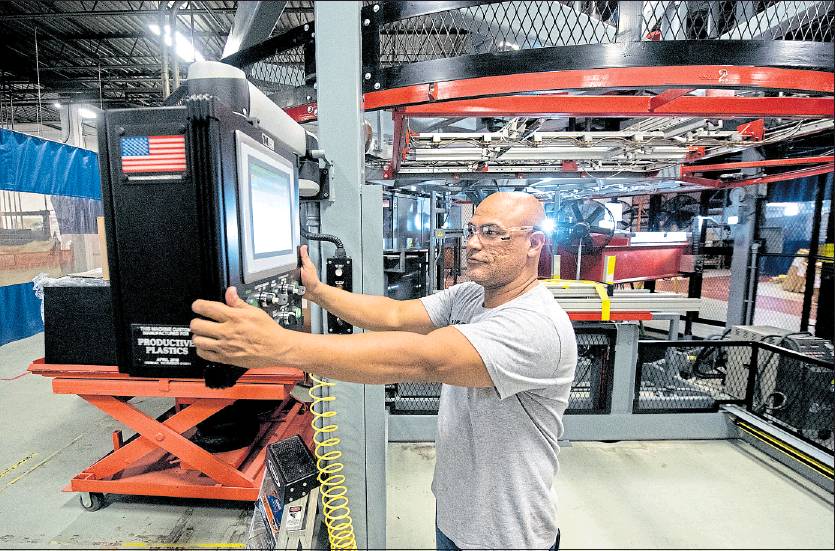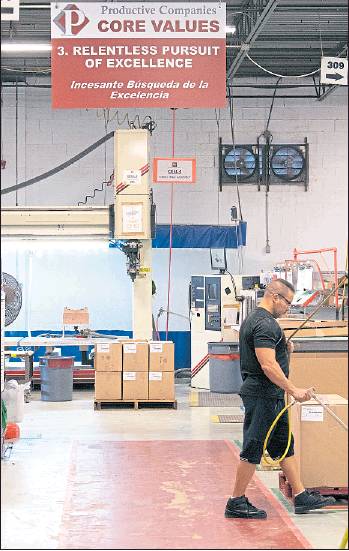Putting Faith At the Forefront
Burlco’s Productive Plastics brings corporate ministry to work.
By Courtney Becker STAFF WRITER
Just inside the entrance to the workroom at Productive Plastics Inc., which molds plastic into parts for manufacturing companies, is a place to post prayers.
A sign above the section reads, “Welcome to Our Prayer Wall,” in English, Spanish, and Vietnamese, and a notepad and pen hang at the bottom of the space. Tucked into the wall are folded pieces of paper, each left by an employee and containing prayers offered up anonymously.
The company’s goal is an audacious one: To encourage all members of Productive Plastics to pray together for each other.
The wall was the focus of much discussion during the company’s monthly Caring Team meeting Aug. 2, when a group of nine people — including managers, employees, and two “corporate ministers” — gathered to discuss the well-being of employees and ways in which the company can better reflect its core values.
The group debated ways to share offerings on the prayer wall and solve real problems while respecting employees’ privacy. One popular idea came from workroom supervisor Joshua Ramos, who suggested using two pads of paper — one white and one yellow — to color-code prayers, ones that employees were comfortable sharing and those they wanted to remain private.
Ramos, a Caring Team member since it was started over a year ago, said participants are chosen by peers rather than managers. Co-workers recommend peers after noticing “there’s fruit in their lives showing the vision of this company,” Ramos said.
Productive Plastics, a privately held firm in Mount Laurel, is an openly Christian business that works with two corporate ministers who counsel employees. The company, family-owned since 1955, makes plastic enclosures for Siemens CT scanners and plastic parts for the Kawasaki rail cars on Long Island Railroad and Metro-North routes in the of interiors for PATCO trains.
“ We’re not there to proselytize. We’re there to care for the needs of the people.
John Zerillo, Productive Plastics vice president of sales
Revenues are in the $12 million to $13 million range, and the firm has seen 20 percent growth in each of the last three years, said John Zerillo, vice president of sales.
Many of the company’s 58 employees work in the plant’s workroom, where temperatures rival those of a certain biblical locale, climbing above 100 degrees from the ovens in machines used to mold plastic sheets. Zerillo said the Caring Team approach has helped lower turnover. “We’re not losing people like we used to,” he said.
The firm’s CEO, Hal Gilham, is a member of the Philadelphia chapter of C12, a network of Christian CEOs, business owners, and executives. Before he was baptized in 2010, however, Gilham felt “there was no place for this Christian living” in his life, and his family was regularly raising concerns about his drinking habits, he said in a reflection that was shared with the Caring Team this month. After connecting with his faith, Gilham decided to extend his born-again Christian values to the way he runs Productive Plastics.
Experts say it can be dangerous to speak openly about faith in the workplace, because nonspiritual employees and co-workers can feel alienated and dislike what they see as proselytizing. Joe Holt, a business professor at the University of Notre Dame who has taught classes on spirituality and religion in the workplace, said a focus on faith and corporate ministry in business is not “all that common” but “also not unheard of.”
The challenge for companies, Holt said, is creating a space where everyone feels comfortable while also allowing employees to gain a sense of personal satisfaction from their work, by connecting it to their faith or otherwise. He said if businesses succeed in fostering that environment, they could see increased productivity from their employees.
“People are at their most engaged, happy, and productive when they see a connection between the work that they are doing and the values and beliefs that define them,” he said.
Executives at Productive Plastics say they do not force religion on anyone. “We’re not there to proselytize,” Zerillo said. “We’re there to care for the needs of the people.”
Zerillo said the company does not ask employees any questions about their religious affiliations, but through conversations between co-workers he knows there are non-Christian employees at the company, including one Muslim and one Jew.
Beside the prayer wall in the workroom is a family sharing board, where employees can post updates about their personal lives they would like to share with coworkers. A rack of pamphlets on issues such as addiction, depression, and anger sits in the lunchroom. A Christian flag hangs on the building’s flagpole underneath the American flag.
Each shift starts with a “Take 5” meeting. The first four minutes of these five-minute meetings are mandatory; time employees receive company notices and the meeting leader discusses manufacturing concepts to keep in mind during work. The last minute is optional and consists of a description of a short scripture passage of the day.
Productive Plastics itself has four core company values, the first of which is to “honor God in all that we do” and the second of which is to “develop people.” Next are the “relentless pursuit of excellence” and the need to “grow profitability.”
Will Seright, who has worked at Productive Plastics for a little over a year, forming parts to fit various appliances, said the heat is the only thing he doesn’t like about working at the company. He said he is “glad religion is accepted” because it has always been a big part of his life but was never a part of his work before now. “You’ve got a lot of love here,” Seright said. “It’s like a family.”
Other employees who spoke privately to a reporter made similar statements.
About two years ago, Productive Plastics began working with corporate ministers Paul and Amy Shumski, a married couple who founded Lifeguide — a corporate chaplaincy service — in December 2014 after serving in traditional pastoral work. Paul Shumski said their goal was to provide “compassionate employee care” for the companies they work with.
He said Lifeguide, which has two full-time and two part-time employees besides the Shumskis, charges around $5 per week per employee at the companies that hire them. He said they have worked with 13 companies since its founding and now have nine clients. Lifeguide always encounters skepticism from employees when it first partners with a company, he said, but what makes Productive Plastics stand out is that the Shumskis say they haven’t encountered any employees who don’t seem to have bought into the company’s mission.
“There’s always a percentage that just like to complain or just like to get off the clock [in conversations with the Shumskis], but honestly, here, I don’t think that’s at all here,” Paul Shumski said. “The employees that work here, they enjoy working here. They’re loyal.” He said Productive Plastics is also the only company with a Caring Team.
Although the Shumskis can offer general thoughts about how to improve conditions during Caring Team meetings, their conversations with employees remain confidential. The Shumskis can only share information with the permission of the employee or if they believe someone is a danger to him or herself or others (both of the Shumskis are mandatory reporters, legally bound to alert others to those concerns).
Amy Shumski said she and her husband “respect all beliefs” in their work and primarily “try to help give them skills to help handle their situation” rather than solving problems for others. They work with companies for the benefit of employees’ mental health, she said, which often gets overlooked in business.
“There are many needs out there,” Amy Shumski said, “and just by bringing chaplains in, Productive Plastics is recognizing that those needs are on many levels.”

